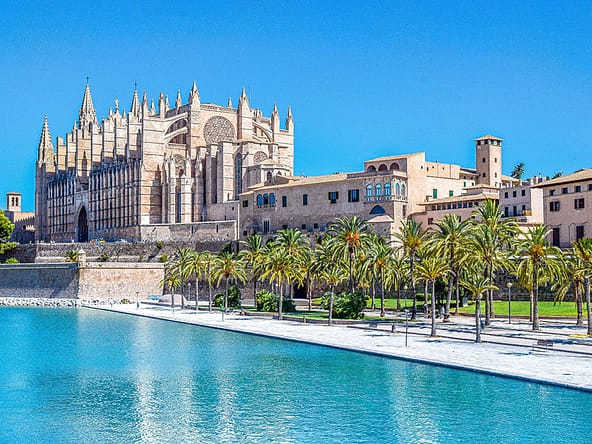Relocating to a brand new country is exciting. Exploring a new culture, tasting new cuisines, meeting new people. Before the fun can begin, though, you’re going to have to make your way down an overwhelming, sometimes stressful path. When buying property in France and making a big move, here’s what you need to know to help things run as smoothly as possible.
Table of Contents
Hiring a Removal Company and Other Pre-Moving Must-Dos
Decide if you’re going to hire a professional removal company or if you’re going to handle the entire move on your own. Carefully compare costs, because moving everything yourself may sound budget-friendly, but you’re not likely to be able to make the move in one go. Making several trips back and forth can quickly add up.
Here are some must-dos for the days leading up to the big move.
Firstly, start collecting boxes early. Even if you hire a removal company, they won’t necessarily provide boxes. It is always a good idea to declutter by selling, donating and throwing away things you don’t want to take. This is an excellent opportunity to trim down the amount of stuff you’ll be moving.
Remember to cancel unwanted deliveries such as magazines, subscriptions, newspapers and redirect the rest of your mail to your new address. Beware that once you’re in France, you’ll need to have your name, not just your address, on your door or mailbox.
It is a good idea to pack a box to keep on hand throughout the move that includes important documents, valuables, and essentials like a change of clothes, toiletries, phone chargers and bed linens. Also wash a final load of laundry before you move! You don’t want to take dirty clothing or towels with you on moving day.
Finally, if needed, get a parking permit and permission for lift access for moving day.
Useful links and resources
Getting a Visa or Permit and Registering with French Authorities
Depending upon your nationality and home country, you may need a French visa in order to travel to France, a residence permit to live in France for more than three months, or both. If you’re going to be studying in France, there may be different requirements to meet. If you currently live in the EU, you do not need a visa to move to France.
The visa de long séjour, also known as a long-stay visa, requires you to register with the Office Francais de l’Immigration et de l’Intégration (OFII) within three months after moving to France. If you don’t have a visa de long séjour, you’ll have to go to the prefecture for a residence permit or to register your French residence.
After buying property in France and moving, you’ll need to register with French authorities, regardless of your nationality. Registration isn’t a fast process and it requires an interview and a medical review, so it’s a good idea to get started as soon as you can.
For more information about obtaining a visa in order to live in France, visit the OFII online.
Observing Etiquette, Learning French and Finding a Job
The business of moving to France can be complex, but sometimes assimilating into a new culture is the trickiest part. You’ll have an easier time if you’re willing learn the cultural norms and etiquette that are expected. If you’re open to the French way of life, you’ll be more accepted in social circles and at work. Expect a culture shock when you first move to France, but know that it will get easier and more familiar with time.
Most of the time, it will be necessary to speak fluent French in order to get a job in the country. This should be a top priority before you relocate and it will also help you through the process of buying property in France. If you don’t speak French, you’ll be very limited when it comes to the jobs you qualify for.
You can attend a language school in France in order to learn the language if you don’t already know it by the time you move, or you can take a French course online. You can also find someone who speaks the language as their first language and who is interested in learning your native language – you can do a language swap to teach one another.
Try out the language whenever you get the chance – the more you use it, the better you’ll get.
Useful links and resources
Setting Up a French Bank Account and Managing Your Finances
A French bank account is called a compte à vue or a dépôt à vue. Having a French bank account will make it easier to process payments. Sometimes you’ll even be required to have a French bank account in order to do things like pay rent or to be paid by your employer. Discuss your specific circumstances with the French bank of your choice. If you’re buying property in France and planning to be self-employed, you may not need a French bank account right away.
In order to open a French bank account, you’ll need an ID and passport; proof of your French residence, such as a lease agreement; and a residence permit, if you have one. Some banks will let you open a French bank account before moving, but make sure to ask what their policy is regarding people who will be relocating to France.
Your French bank account can be opened in one day and you’ll receive your bank card and checkbook within a minimum of 10 business days. Since it can take a while to get your bank card and checkbook, it’s best to have euros or an international bank card with you when you first move, plus enough finances to get you through the first few weeks.
Useful links and resources
Paying French Taxes and Social Security
If you’re going to be living and working in France for more than 182 days each year, you’ll be considered a tax resident immediately upon your arrival. Once you move to France and are considered a French resident, you’ll need to pay taxes by either May 31 or the month of June, depending on how you file your tax return – if you file it online, you have until June to pay. You’ll also need to register with the tax office or mairie in order to pay social security.
If you don’t pay your taxes on time, you could get fined up to 10% of the tax bill. While you’ll most likely have a tax form sent to you, contact the tax office or the mairie in your area if you don’t receive one during your first year in France. Even if you think you’re going to fall under the income threshold and won’t have to pay taxes, you still need to file on time every year.
Accessing French Health Insurance
Health insurance in France is mandatory. Once you move to France, you’ll legally be required to have health insurance. This is the only way that you’ll be able to use the French healthcare system. Most people who move to France will be able to qualify for the state French health insurance, called sécurité sociale. You will have to register with Caisse Primaire d’Assurance Maladie (CPAM) before you can use the French healthcare system. French healthcare doesn’t cover 100% of most medical costs, so a lot of people opt to get additional insurance to cover the gap. In this case, or if you don’t qualify for state health insurance, you’ll need to sign up for private health insurance.It’s also a good idea to register with a local doctor and dentist as soon as you can. If you should fall ill or need medical attention shortly after moving, you’ll know exactly where to go. Keep French emergency numbers handy, too: 112 is the number to reach all emergency services in Europe.
Useful links and resources
Signing Up for Home Insurance
After buying property in France, it’s wise to invest in home insurance that will cover a host of events, including fire, water damage and theft. If you’re going to be renting for a period of time, it’s important to know that landlords are allowed to require renters to get home insurance. If the landlord requires this, you must prove that you have home insurance. If you don’t, the landlord is legally allowed to evict you, so long as the home insurance requirement is in the lease clause. Some landlords will purchase the insurance on your behalf and require you to reimburse them.
Managing Utilities and Waste
Most often, EDF will supply your electricity and GDF will supply your gas. In order to make sure your utility bills are correct, take note of your meter readings and compare them to your bills. If your landlord handles your utilities, keep them up-to-date on the meter readings. Ask your landlord or neighbors which day of the week the household waste and recycling are collected. This will vary depending on the area of France.
Setting Up Telephone, Internet and TV
France is on the GSM mobile system, which means your mobile phone will need to use this system. If it can’t, you won’t be able to use your phone in France. For phones that can use the GSM system, you may need a French SIM card and phone number. Otherwise, you’ll be charged international rates when you call within France. The phone and Internet provider you choose will partly depend on where you are buying property in France. In some areas, you’ll be able to pick and choose the providers you want. In other areas, though, you’ll have to get in touch with Orange S.A., originally called France Télécom. As an alternate to having a regular landline setup, you can opt to use VOIP systems like Skype, which allow you to make calls through your Internet service. Also note that in France, residents must pay a license fee if they have a TV.
Getting Around France
As early as possible, figure out where you can access public transport in your area, including airports, trains and buses. If you’re going to have a car, figure out the best routes to the places you’ll frequent, like the grocery store.
Rural roads in France tend to be free of traffic and in great condition. If you have an EU or EEA driver’s license, it will be valid in France. If you have a non-EU license, it will only be valid for one year and you will also need an official French translation of the license.
Many French cities have self-service bike rentals available 24 hours thanks to the Vélib’ program. You can pick up and drop off bikes at any of the stations at any time. For quicker transportation around town, consider purchasing a moped.
Useful links and resources
Enjoying Your Move!
There’s so much that goes into buying property in France, preparing for your move, managing moving day, and then settling in to a completely new life. It’s nearly impossible to get each and every “To Do” out of the way and you’re bound to have some loose ends to tie up in the days and weeks following your relocation. Knowing which official buildings you’ll need to contact, understanding the language and being familiar with French terminology will help you immensely. Eventually, the paperwork will be behind you and all you’ll have left to do is enjoy your new hometown.
We wish you a wonderful move and congratulations on your new life in France!















